Bacteriophage targeting of gut bacterium attenuates alcoholic liver disease
- PMID: 31723265
- PMCID: PMC6872939
- DOI: 10.1038/s41586-019-1742-x
Bacteriophage targeting of gut bacterium attenuates alcoholic liver disease
Abstract
Chronic liver disease due to alcohol-use disorder contributes markedly to the global burden of disease and mortality1-3. Alcoholic hepatitis is a severe and life-threatening form of alcohol-associated liver disease. The gut microbiota promotes ethanol-induced liver disease in mice4, but little is known about the microbial factors that are responsible for this process. Here we identify cytolysin-a two-subunit exotoxin that is secreted by Enterococcus faecalis5,6-as a cause of hepatocyte death and liver injury. Compared with non-alcoholic individuals or patients with alcohol-use disorder, patients with alcoholic hepatitis have increased faecal numbers of E. faecalis. The presence of cytolysin-positive (cytolytic) E. faecalis correlated with the severity of liver disease and with mortality in patients with alcoholic hepatitis. Using humanized mice that were colonized with bacteria from the faeces of patients with alcoholic hepatitis, we investigated the therapeutic effects of bacteriophages that target cytolytic E. faecalis. We found that these bacteriophages decrease cytolysin in the liver and abolish ethanol-induced liver disease in humanized mice. Our findings link cytolytic E. faecalis with more severe clinical outcomes and increased mortality in patients with alcoholic hepatitis. We show that bacteriophages can specifically target cytolytic E. faecalis, which provides a method for precisely editing the intestinal microbiota. A clinical trial with a larger cohort is required to validate the relevance of our findings in humans, and to test whether this therapeutic approach is effective for patients with alcoholic hepatitis.
Conflict of interest statement
Competing interests
B.S. is consulting for Ferring Research Institute. However, there is no competing interest with regard to this study. All other authors declare no competing interests.
Figures

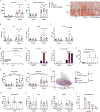


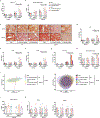
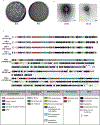
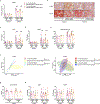

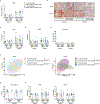


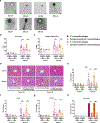

Comment in
-
Microbial clues to a liver disease.Nature. 2019 Nov;575(7783):451-453. doi: 10.1038/d41586-019-03417-3. Nature. 2019. PMID: 31745353 No abstract available.
-
Manipulating the gut microbiota to combat alcoholic hepatitis.Nat Rev Gastroenterol Hepatol. 2020 Jan;17(1):3. doi: 10.1038/s41575-019-0246-3. Nat Rev Gastroenterol Hepatol. 2020. PMID: 31784706 No abstract available.
-
Phages fight alcoholic hepatitis.Nat Rev Drug Discov. 2020 Jan;19(1):20. doi: 10.1038/d41573-019-00198-2. Nat Rev Drug Discov. 2020. PMID: 31907420 No abstract available.
-
Bacteriophage Prevents Alcoholic Liver Disease.Cell. 2020 Jan 23;180(2):218-220. doi: 10.1016/j.cell.2019.12.034. Cell. 2020. PMID: 31978341
-
Phage Therapy for Alcohol-Associated Hepatitis.Hepatology. 2021 Apr;73(4):1609-1610. doi: 10.1002/hep.31623. Epub 2021 Mar 16. Hepatology. 2021. PMID: 33226160 No abstract available.
References
-
- Llopis M et al. Intestinal microbiota contributes to individual susceptibility to alcoholic liver disease. Gut 65, 830–839 (2016). - PubMed
Publication types
MeSH terms
Substances
Grants and funding
- R01 AA020703/AA/NIAAA NIH HHS/United States
- UL1 TR001863/TR/NCATS NIH HHS/United States
- I01 BX004594/BX/BLRD VA/United States
- P30 DK120515/DK/NIDDK NIH HHS/United States
- R01 AA024726/AA/NIAAA NIH HHS/United States
- 093869/WT_/Wellcome Trust/United Kingdom
- T32 GM070421/GM/NIGMS NIH HHS/United States
- P50 AA011999/AA/NIAAA NIH HHS/United States
- P30 DK034989/DK/NIDDK NIH HHS/United States
- U01 AA026939/AA/NIAAA NIH HHS/United States
- U01 AA021908/AA/NIAAA NIH HHS/United States
- P30 DK120531/DK/NIDDK NIH HHS/United States
LinkOut - more resources
Full Text Sources
Other Literature Sources
Medical
Molecular Biology Databases

